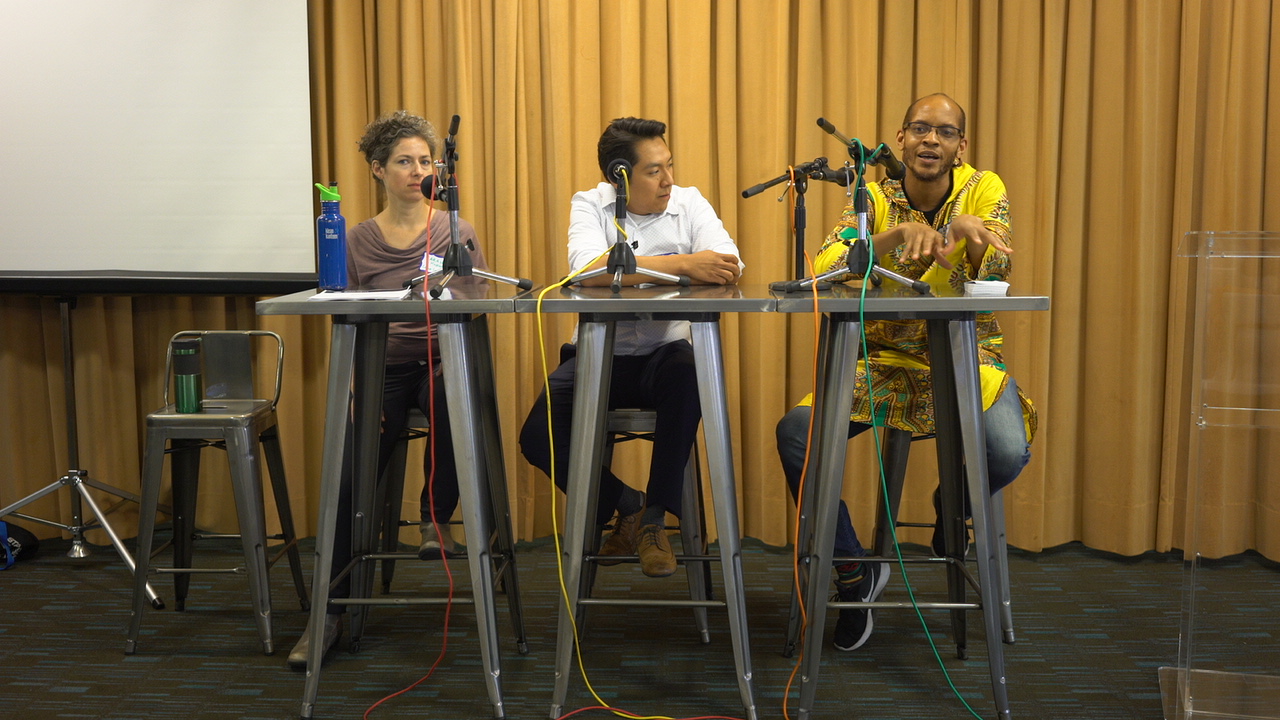Introductions
- Mike Strode—Kola Nut Collaborative
- The Kola Nut Collaborative is a time bank, trading time as a currency, using time as an incentive to unpack skills and meet needs. When financial capital is low, cultural and social capital is available
- Sarah Kaplan—Co-op lawyer
- Founded vegetarian food cooperative
- Alex
- Discusses policy amendments to the cooperative statute. These amendments opened up the potential to provide service-based cooperatives
- Reminds the audience that a cooperative is a business, but it is important to keep the social values in tact. Integrate social values into bylaws
Notes
Do you think of yourself as a cooperator?
- Sarah:
- Lived in housing co-ops, but didn’t have a great experience
- Is now a contract lawyer in a firm that is not a cooperative, and is discovering how lawyers can work together cooperatively
What social value do Mike’s study groups provide?
- Mike:
- Study groups are a wonderful format for getting people together for a common purpose
- Maintaining social value requires embedding social value in the basis of what is being launched
- Assets should be examined in the community, and we should ask ourselves how they can be enhanced
What other things are important?
- Alex: Reminds the audience of the importance of structured meetings
- How to facilitate a meeting
- Notetaking, facilitators, defined roles, switching roles, etc.
- Identify leaders and give them the tools to self-organize
- Conflict resolution and mediation: Competitive culture can develop
- Ego, misconceptions, miscommunications, etc.
- Approach a group, make sure everyone has a voice, listens, and nobody is attacking each other
- How to facilitate a meeting
- Mike tells the audience how this summit came to be
- The idea was formulated during a small workshop after Solidarity Economy 101 meeting
What have your favorite collaborations have been so far?
- Sarah:
- Meeting a lawyer at The Working World. This lawyer was very excited about cooperatives
- Local investment co-ops and developing more across the country
Mike opens up the discussion to the audience—“What brings you here?”
- One audience member asks about the processes of conversion—converting from a traditional business to a cooperative model
- Alex discusses unions and their assistance in conversion:
- Example: Sit in, Goose Island; Workers were already organizing and had a cooperative mindset and back history
- Does the existing business already have knowledge of the cooperative workplace?
- Alex discusses unions and their assistance in conversion:
- Mike discusses the Healthy Food Hub, a popup retail initiative
- Reverse Community Supported Agriculture (CSA), members purchasing shares, servicing multiple farm communities, calculating demand so the farmers knew what to grow
- How to transform this to a consumer cooperative? Challenges: a) Didn’t have a way to step back from the work to educate the consumers b)No education of the workforce c) An ecosystem should be in place for the community to take on the worker cooperative
- What makes worker cooperatives successful or better than the non-cooperative models?
- Entrepreneurial mindset; Collective entrepreneurship
- Keys to success: a) Good business plan b) Something for everyone to get involved in and get excited about
- Getting communities to be their own distribution hubs
- Tools/practices to help connect to/organize with the community
- Sharing ideas with others
- Immigrant rights/workers rights workshops
- Hubs that already exist
- Schools, parents, kids
- Workshops in the schools: Immigrant rights workshop develops into worker’s rights workshop, develops into work cooperatives workshop, etc.
- Having a clear end statement
- Similar to a mission statement
- Publicizing what you’re doing and what your goals are

